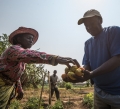News

09 Apr 2020
Fall Armyworm (FAW) (Spodoptera frugiperda), is an insect pest affecting more than 80 plant species, causing damage to economically important cultivated cereals such as maize, rice, sorghum, as well as vegetable crops and cotton. It is native to tropical and subtropical regions of the Americas. It is the larval stage of the insect that causes the damage. FAW reproduces at a rate of several generations per year, and the moth can fly up to 100 km per night.
Over the past three years, the Food and Agriculture Organization of the UN (FAO), has led 63 Fall Armyworm-related projects, mostly...
07 Apr 2020
7 April 2020, Rome/Nanjing - The Food and Agriculture Organization of the United Nations (FAO) and the Jiangsu Academy of Agricultural Sciences (JAAS) have signed a partnership agreement which foresees joint efforts to support smallholder farmers through technological innovation. 
27 Mar 2020
In the last 20 years, project partner countries such as Argentina, Bolivia, Colombia, Ecuador, Paraguay and Peru, where 80 percent of cotton production is in the hands of family farmers or small-scale agriculture, have faced a decrease in cotton production, affecting the potential of thousands of farming families to generate income. South-South and triangular cooperation (SSTC) represents an opportunity for the exchange of knowledge and experiences, generating innovation in terms of technology and management of the cotton sector in the countries involved in the +Cotton Project.
Through the +Cotton Project, a regional network of more than 70 public and private sector...
20 Mar 2020
After more than two decades of increasing collaboration FAO and China established in 2009 the FAO–China South–South Cooperation Programme, with a trust fund of USD 80 million provided by China.
Highlighting the voices of beneficiary farmers and smallholders, as well as FAO Director-General QU Dongyu, this video demonstrates the grassroots impact of the FAO-China South-South Cooperation Programme over the last ten years. Farmers from the Democratic Republic of the Congo, Mongolia and Uganda share their experiences with the Programme, describing how it has improved their production, nutrition, environment, and overall life and livelihood.
Key results of the FAO-China South-South Cooperation Programme:
• More...
02 Mar 2020
For many people around the world, cotton is a safety net. As a crop resistant to climatic changes, it can be planted in dry and arid zones and represents a real economic lifeline in rural areas where there are high levels of poverty.
South-South and Triangular Cooperation is all about: sharing lessons across countries with similar challenges, learning what works for development and empowering each other in the process.